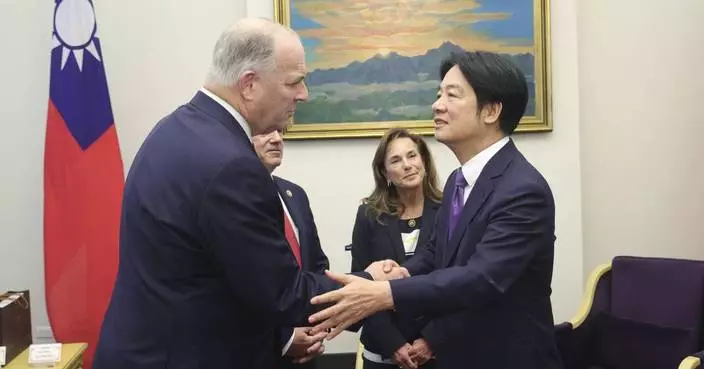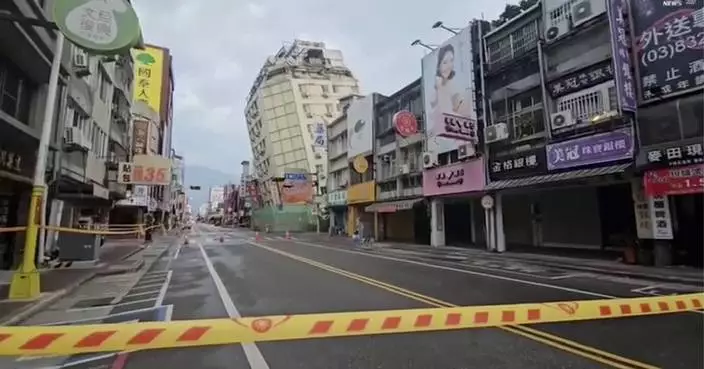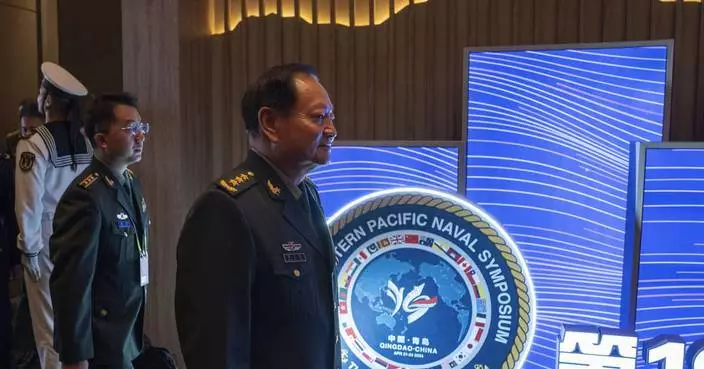A Taiwanese pro-democracy activist pleaded guilty Monday in a Chinese court to subverting the power of the state, but his wife dismissed the trial as "a political show" and his supporters said he had been forced to confess to crimes he didn't commit.
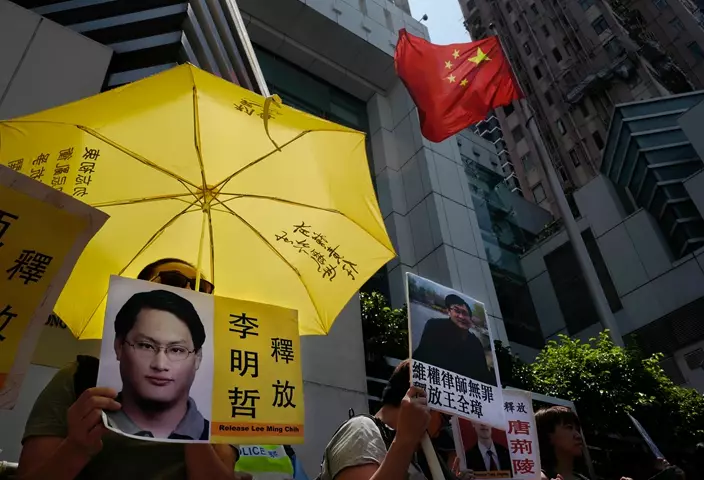
A protester, left, holds a photo of Taiwanese activist Lee Ming-che during a demonstration outside the Chinese liaison office in Hong Kong Monday, Sept. 11, 2017.The photo reads: "Release Lee Ming-che." (AP Photo/Vincent Yu)
Lee Ming-che's trial marked China's first criminal prosecution of a nonprofit worker since Beijing passed a law tightening controls over foreign non-governmental organizations.
Click to Gallery
A Taiwanese pro-democracy activist pleaded guilty Monday in a Chinese court to subverting the power of the state, but his wife dismissed the trial as "a political show" and his supporters said he had been forced to confess to crimes he didn't commit.
Lee Ming-che's trial marked China's first criminal prosecution of a nonprofit worker since Beijing passed a law tightening controls over foreign non-governmental organizations.
Lee told the court in the central Chinese city of Yueyang that he had "spread articles that maliciously attacked the Communist Party of China, China's existing system and China's government." He said he had also organized people and wrote articles "intended to subvert the state's power."
Subversion of state power is a vaguely defined charge often used by authorities to muzzle dissent and imprison critics. The court has not yet announced a punishment for Lee.
"Today the whole world witnessed a political show with me," Lee Ching-yu said after the trial, showing an arm tattoo proclaiming "I'm proud of you, Lee Ming-che."
"This trial is illegal," said Hsiao I-Min, who traveled to Yueyang with Lee's wife and is with the Taiwanese non-governmental organization Judicial Reform Foundation. Lee "was forced to confess a false truth."
Security was tight at the Yueyang City Intermediate People's Court, with barricades on the streets, dozens of security personnel patrolling the perimeter and reporters ordered to leave the area.
Amnesty International and other rights organizations have called for his immediate release.
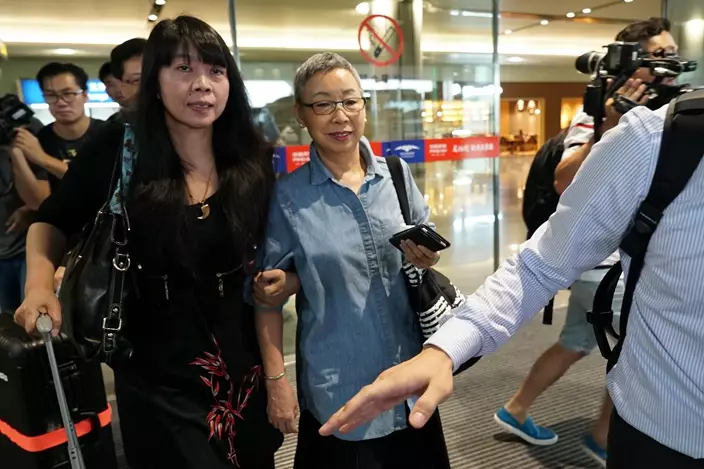
Kou Shou-chin, mother of detained Taiwanese activist Lee Ming-che, center, is chased by reporters as she arrives at the Changsha International Airport ahead of her son's trial which open on Monday, in Changsha, central China's Hunan Province, Sunday, Sept. 10, 2017. (AP Photo/Emily Wang)
Lee told the court in the central Chinese city of Yueyang that he had "spread articles that maliciously attacked the Communist Party of China, China's existing system and China's government." He said he had also organized people and wrote articles "intended to subvert the state's power."
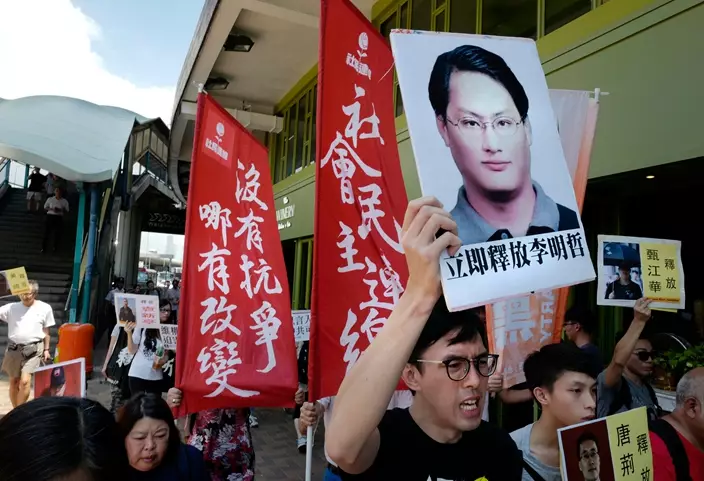
A protester raises a picture of Taiwanese activist Lee Ming-che during a demonstration outside the Chinese liaison office in Hong Kong Monday, Sept. 11, 2017. The photo reads: "Release Lee Ming-che immediately." (AP Photo/Vincent Yu)
Subversion of state power is a vaguely defined charge often used by authorities to muzzle dissent and imprison critics. The court has not yet announced a punishment for Lee.
Lee's wife, Lee Ching-yu, who was in Yueyang for the trial, had warned that he might be pressured into pleading guilty. China's wide-ranging crackdown on civil society has featured a string of televised "confessions" — believed to have been coerced — from human rights activists accused of plots to overthrow the political system.
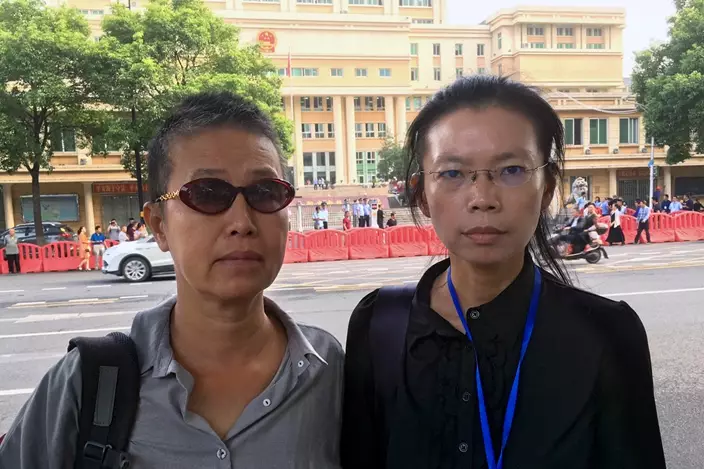
In this photo released by Taiwan Association for Human Rights, Lee Ching-yu, right, wife of detained Taiwanese activist Lee Ming-Che, poses for a photo with Wang Li-ping, a former Democratic Progressive Party lawmaker, before entering the Yueyang Intermediate People's Court in south China's Hunan province, Monday, Sept. 11, 2017. (Taiwan Association for Human Rights via AP)
"Today the whole world witnessed a political show with me," Lee Ching-yu said after the trial, showing an arm tattoo proclaiming "I'm proud of you, Lee Ming-che."
"We also witnessed how different the core values are of Taiwan and China," she added.
Lee's supporters blasted the legal process.
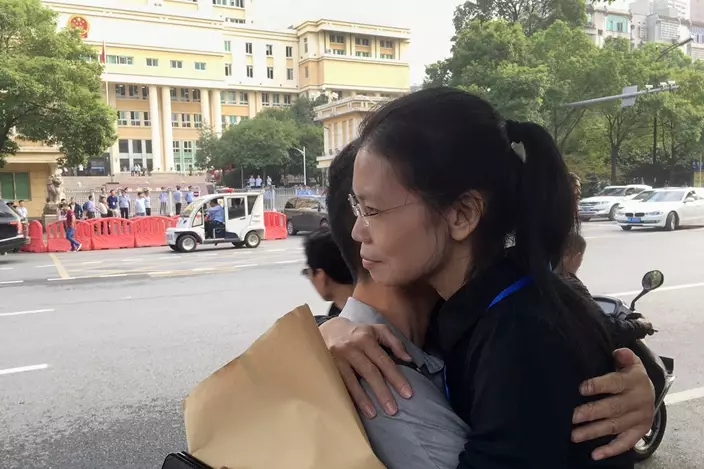
In this photo released by Taiwan Association for Human Rights, Lee Ching-yu, right, hugs Wang Li-ping, before entering the Yueyang Intermediate People's Court in south China's Hunan province, Monday, Sept. 11, 2017. (Taiwan Association for Human Rights via AP)
"This trial is illegal," said Hsiao I-Min, who traveled to Yueyang with Lee's wife and is with the Taiwanese non-governmental organization Judicial Reform Foundation. Lee "was forced to confess a false truth."
"Pursuing democracy and freedom is not a crime," Hsiao continued.
Dozens of pro-democracy activists in Hong Kong marched to the China Liaison Office on Monday to protest Lee's prosecution.
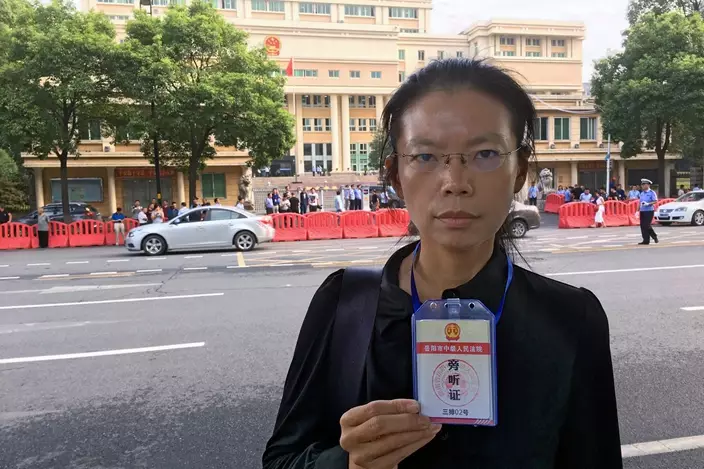
In this photo released by Taiwan Association for Human Rights, Lee Ching-yu, shows a pass allowing her to enter a courtroom upon arrival at the Yueyang Intermediate People's Court in south China's Hunan province, Monday, Sept. 11, 2017. (Taiwan Association for Human Rights via AP)
Security was tight at the Yueyang City Intermediate People's Court, with barricades on the streets, dozens of security personnel patrolling the perimeter and reporters ordered to leave the area.
Lee, 42, has conducted online lectures on Taiwan's democratization and managed a fund for families of political prisoners in China. He cleared immigration in the semi-autonomous Chinese territory of Macau on March 19 but never showed for a planned meeting with a friend later that day.

Reporters watch a screen showing a video footage of detained Taiwanese activist Lee Ming-Che testifying at his trial at the Yueyang Intermediate People's Court in Yueyang, south China's Hunan province, Monday, Sept. 11, 2017. (AP Photo/Emily Wang)
Amnesty International and other rights organizations have called for his immediate release.
The new law says foreign NGOs must not endanger China's national security and ethnic unity, and subjects nonprofit groups to close police supervision. It is seen as an attempt to clamp down on perceived threats to the ruling Communist Party's control.

A policeman stands watch from the barricaded Yueyang Intermediate People's Court where detained Taiwanese activist Lee Ming-Che stood trial in Yueyang, south China's Hunan province, Monday, Sept. 11, 2017. (AP Photo/Emily Wang)
Relations between Taiwan and China have been near an all-time low since the election of Taiwanese President Tsai Ing-wen, whose Democratic Progressive Party has advocated Taiwan's formal independence. China cut off contacts with Taiwan's government in June, five months after Tsai was elected.
Lee's co-defendant, Peng Yuhua, who is from mainland China, also pleaded guilty. Peng said he had founded an organization called Palm Flower Co. to pressure China to accept a multiparty political system. Lee was his deputy in charge of education, Peng said.
SHANGHAI (AP) — U.S. Secretary of State Antony Blinken raised what the U.S. describes as unfair Chinese trade practices during his first full day of meetings in China on Thursday with local government officials in the financial hub of Shanghai.
Blinken met with the city's top official, Communist Party Secretary Chen Jining, and “raised concerns about (Chinese) trade policies and non-market economic practices," the State Department said in a statement.
It said he stressed that the United States seeks healthy economic competition with China and "a level playing field for U.S. workers and firms operating in China.”
“The two sides reaffirmed the importance of ties between the people of the United States and (China), including the expansion of exchanges between students, scholars, and business,” it said.
China's multibillion-dollar trade surplus with the U.S. along with accusations of intellectual property theft and other practices seen as discriminating against U.S. businesses in China have long been a source of friction in relations.
China, for its part, has objected strongly to U.S. accusations of human rights abuses and Washington's support for Taiwan, the self-governing island that Beijing considers its own territory and warns could be annexed by force.
Asked about Blinken's comments, Chinese Foreign Ministry spokesperson Wang Wenbin said China has “always conducted economic and trade cooperation in accordance with market principles, firmly supported the multilateral trading system, and fully complied with the rules of the World Trade Organization.”
“We hope the U.S. will also earnestly respect the principle of fair competition, abide by the WTO rules, and work with China to create favorable conditions for the sound and stable development of China-U.S. economic and trade relations,” Wang told reporters at a daily briefing.
Blinken also spoke with students and business leaders before flying to Beijing for what are expected to be contentious talks with national officials, including Foreign Minister Wang Yi and possibly President Xi Jinping.
Blinken arrived in Shanghai on Wednesday shortly before U.S. President Joe Biden signed a $95 billion foreign aid package that has several elements likely to anger Beijing, including $8 billion to counter China’s growing aggressiveness toward Taiwan and in the South China Sea. It also seeks to force TikTok’s China-based parent company to sell the social media platform.
China has railed against U.S. assistance to Taiwan and immediately condemned the aid as a dangerous provocation. It also strongly opposes efforts to force TikTok’s sale.
Still, the fact that Blinken made the trip — shortly after a conversation between Biden and Xi, a visit to China by Treasury Secretary Janet Yellen and a call between the U.S. and Chinese defense chiefs — is a sign the two sides are at least willing to discuss their differences.
“I think it’s important to underscore the value — in fact, the necessity — of direct engagement, of speaking to each other, laying out our differences, which are real, seeking to work through them,” Blinken told Chen, according to the State Department statement.
“We have an obligation for our people, indeed an obligation to the world, to manage the relationship between our two countries responsibly,” he said. “That is the obligation we have, and one that we take very seriously.”
Chen agreed with that sentiment and said the recent Biden-Xi call had helped the “stable and healthy development of our two countries’ relationship.”
“Whether we choose cooperation or confrontation affects the well-being of both peoples, both countries, and the future of humanity,” he said.
Chen added that he hoped Blinken was able to get a “deep impression and understanding” of Shanghai, a city of skyscrapers, ports and more than 25 million people that is a magnet for commercially ambitious young people from China and abroad.
Most recently, the U.S. has raised concerns that potential overcapacity in Chinese industries — such as electric vehicles, steel and solar panels — might crowd out U.S. and other foreign manufacturers.
Shortly after arriving, Blinken attended a Chinese basketball playoff game between the local Shanghai Sharks and the Zhejiang Golden Bulls, with the home team losing in the last seconds in a 121-120 nailbiter.
With the U.S. presidential race heating up, it’s unclear what ramifications a victory for either Biden or former President Donald Trump might have for relations. But Trump could deepen a trade war he started during his first term. His tough rhetoric on China and isolationist approach to foreign policy could ramp up uncertainties.
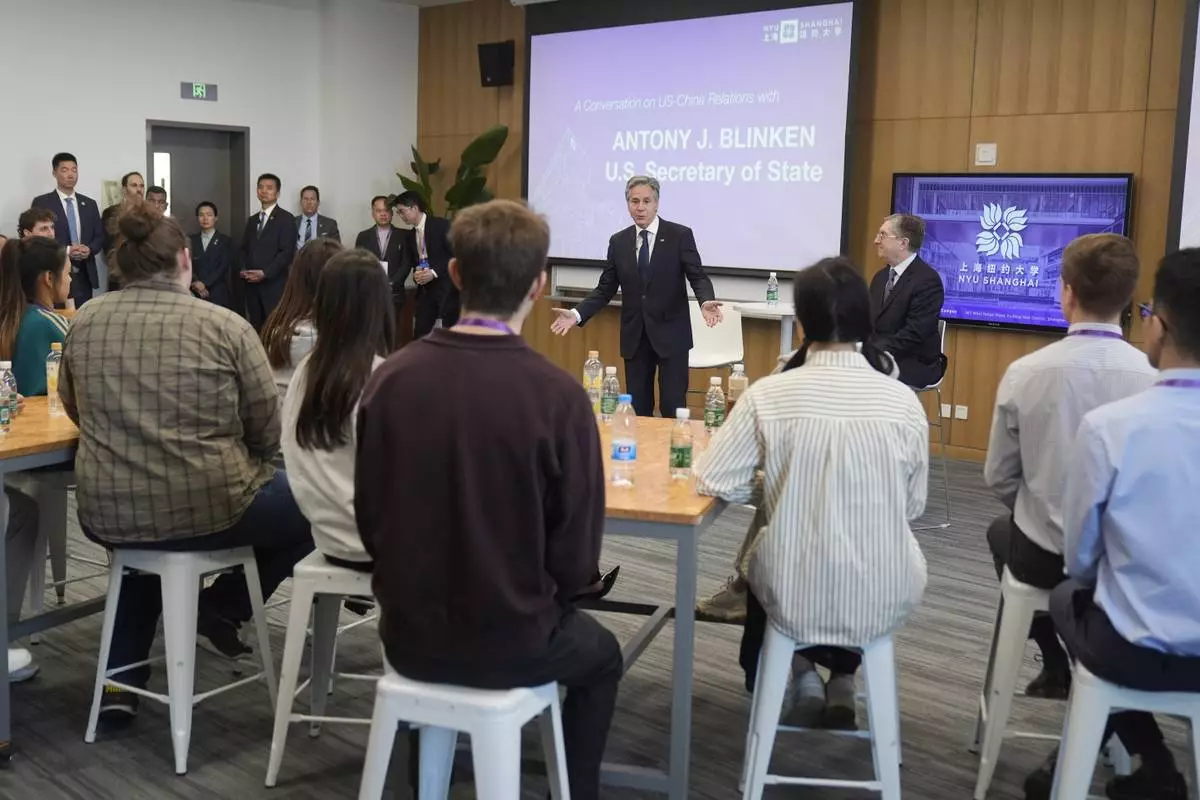
U.S. Secretary of State Antony Blinken, center, with NYU Shanghai Vice Chancellor Jeffrey Lehman, back right, talks to students at NYU Shanghai, Thursday, April 25, 2024, in Shanghai, China. (AP Photo/Mark Schiefelbein, Pool)
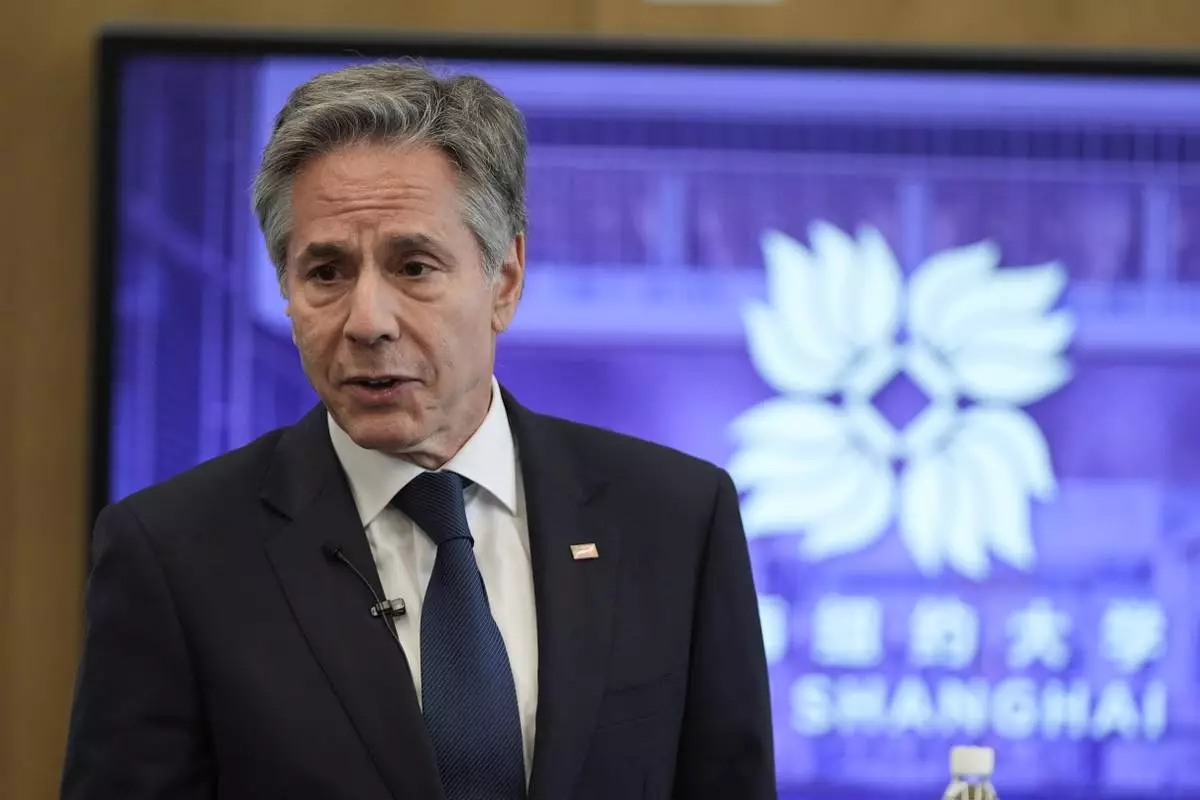
U.S. Secretary of State Antony Blinken talks to students at NYU Shanghai, Thursday, April 25, 2024, in Shanghai, China. (AP Photo/Mark Schiefelbein, Pool)
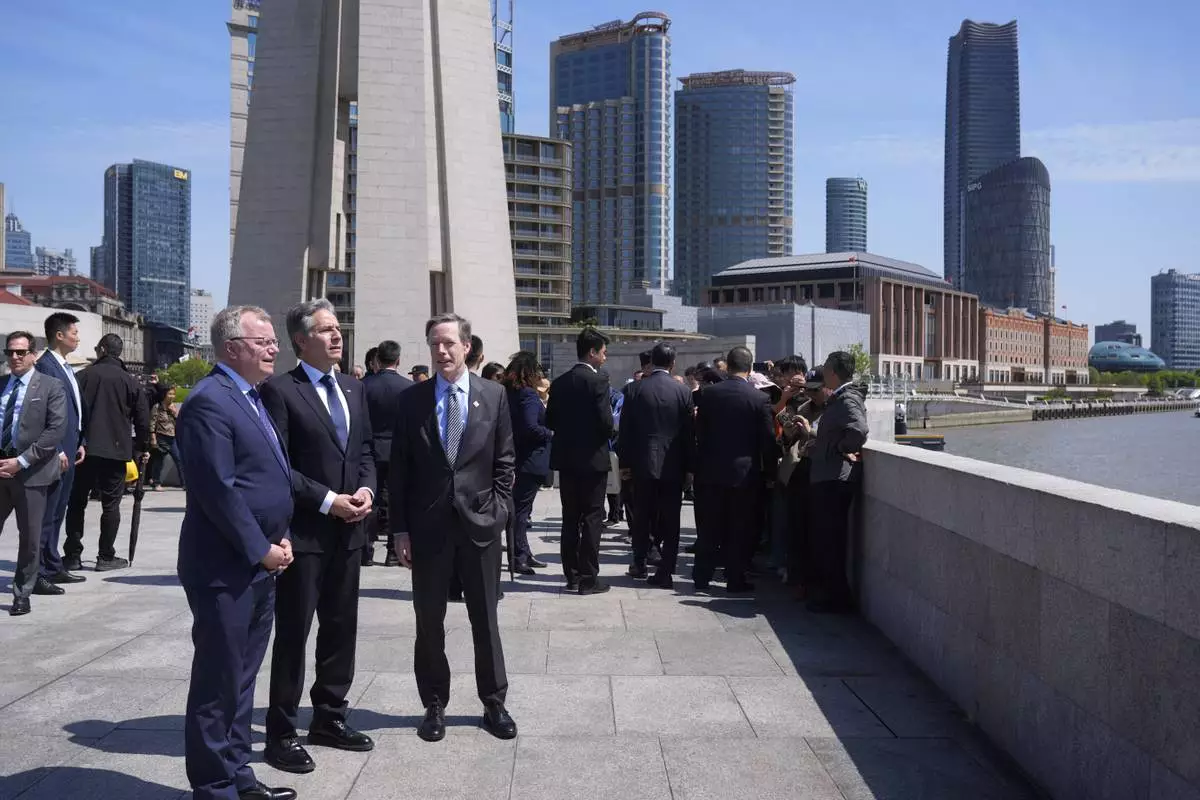
U.S. Secretary of State Antony Blinken, second left, U.S. Ambassador to China Nicholas Burns, third left, and Scott Walker, left, Consul General at the U.S Consulate General in Shanghai, visit a waterfront area called The Bund, Thursday, April 25, 2024, in Shanghai, China. (AP Photo/Mark Schiefelbein, Pool)
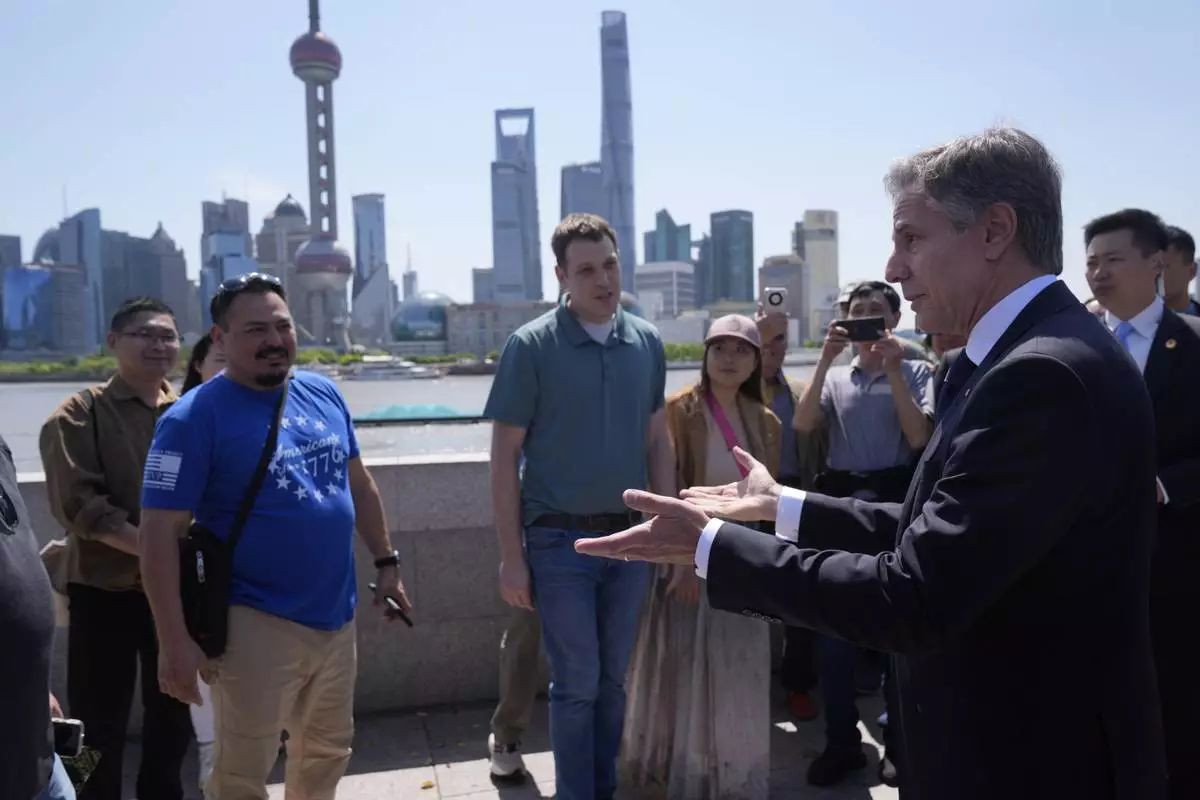
U.S. Secretary of State Antony Blinken, right, talks with U.S. tourists as he walks in a waterfront area called The Bund, Thursday, April 25, 2024, in Shanghai, China. (AP Photo/Mark Schiefelbein, Pool)
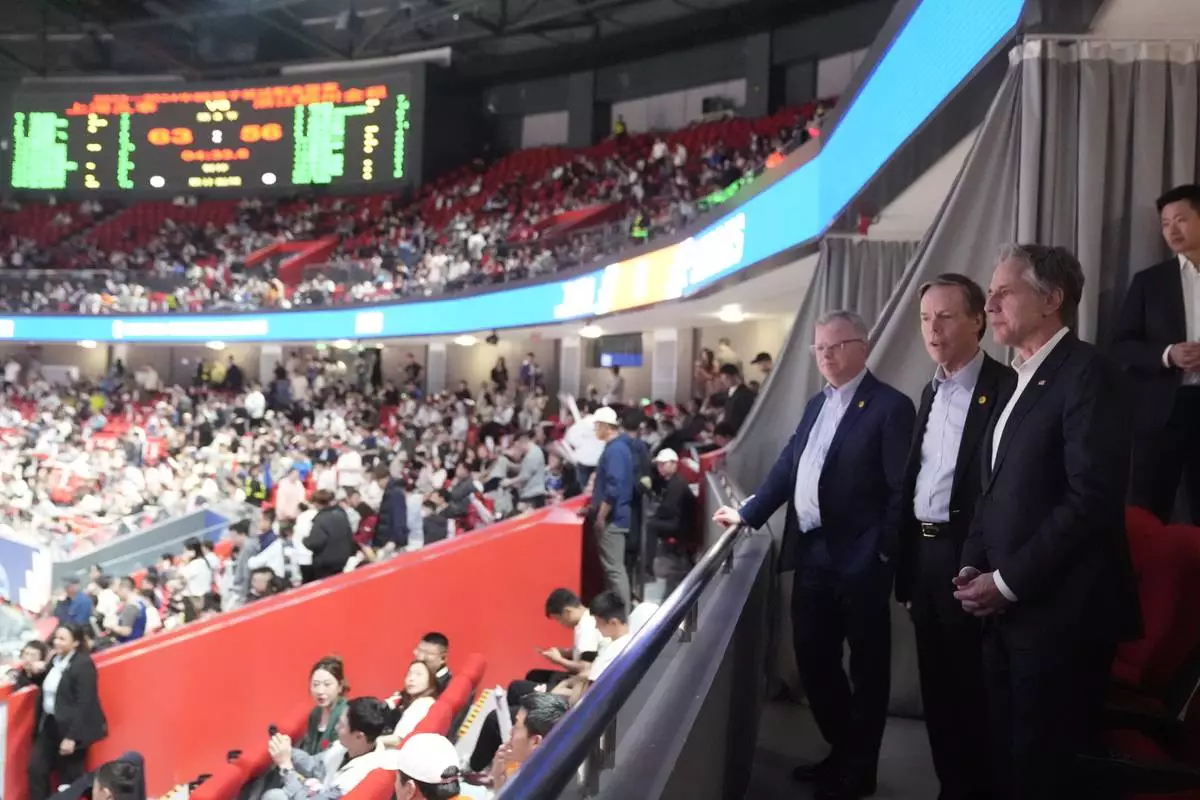
U.S. Secretary of State Antony Blinken talks with U.S. Ambassador to China Nicholas Burns, center, with U.S. Consulate General in Shanghai Scott Walker, left, while attending a basketball game between the Shanghai Sharks and the Zhejiang Golden Bulls at the Shanghai Indoor Stadium, Wednesday, April 24, 2024, in Shanghai, China. (AP Photo/Mark Schiefelbein, Pool)

U.S. Secretary of State Antony Blinken talks with U.S. Ambassador to China Nicholas Burns, center, with U.S. Consulate General in Shanghai Scott Walker, right, while attending a basketball game between the Shanghai Sharks and the Zhejiang Golden Bulls at the Shanghai Indoor Stadium, Wednesday, April 24, 2024, in Shanghai, China. (AP Photo/Mark Schiefelbein, Pool)
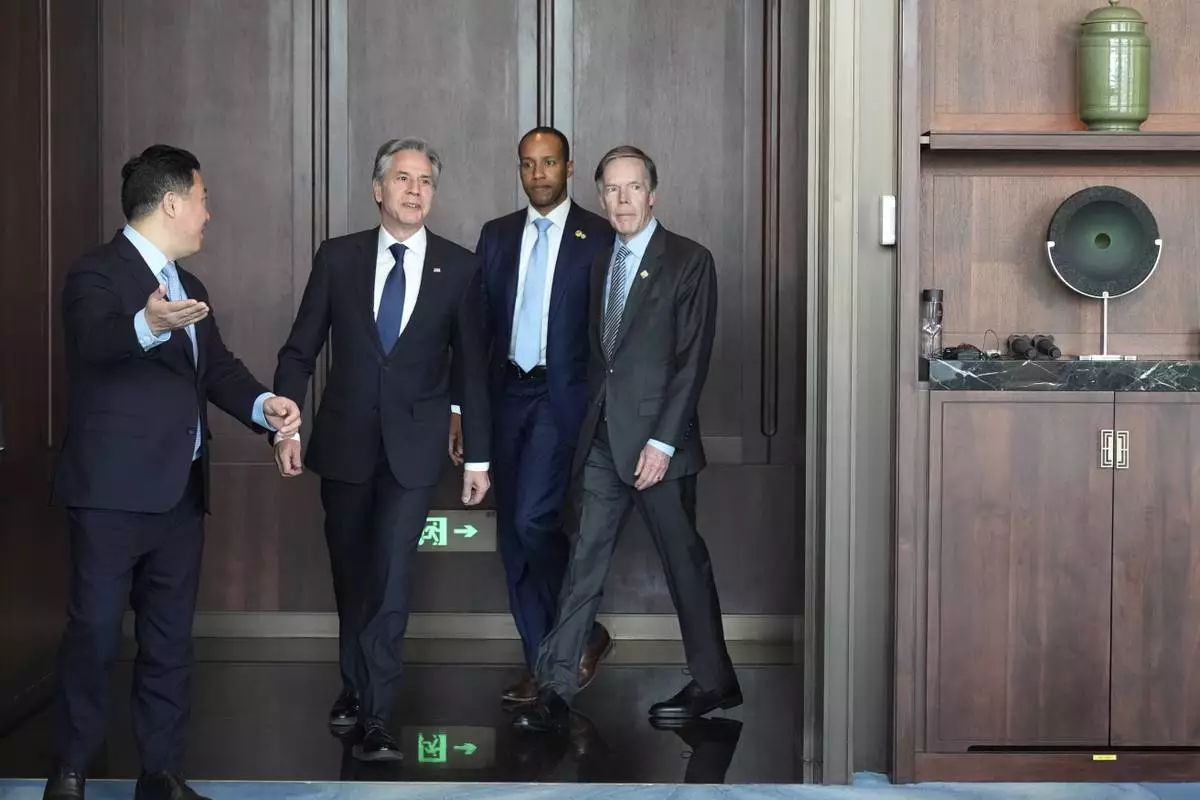
U.S. Secretary of State Antony Blinken, second left, and U.S. Ambassador to China Nicholas Burns, far right, arrive at the Grand Halls to meet with Shanghai Party Secretary Chen Jining on Thursday, April 25, 2024, in Shanghai, China. (AP Photo/Mark Schiefelbein, Pool)
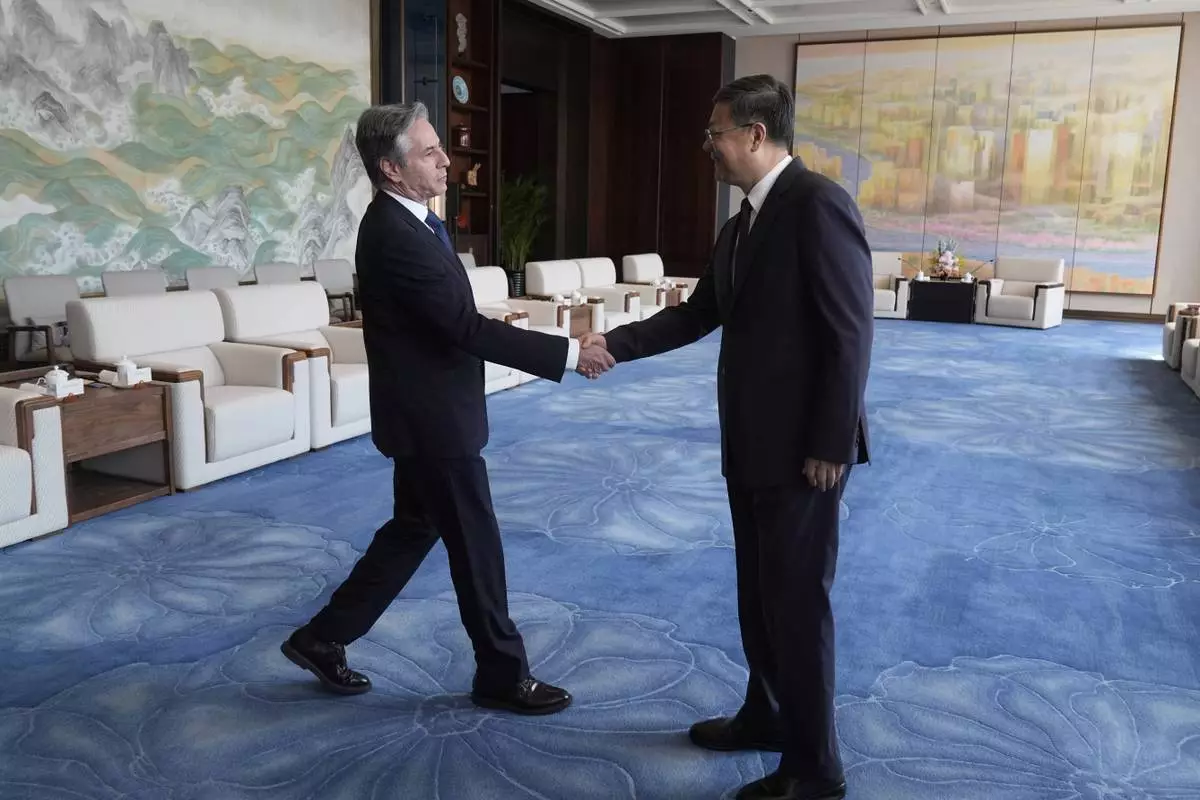
U.S. Secretary of State Antony Blinken, left, shakes hans with Shanghai Party Secretary Chen Jining as they meet at the Grand Halls, Thursday, April 25, 2024, in Shanghai, China. (AP Photo/Mark Schiefelbein, Pool)
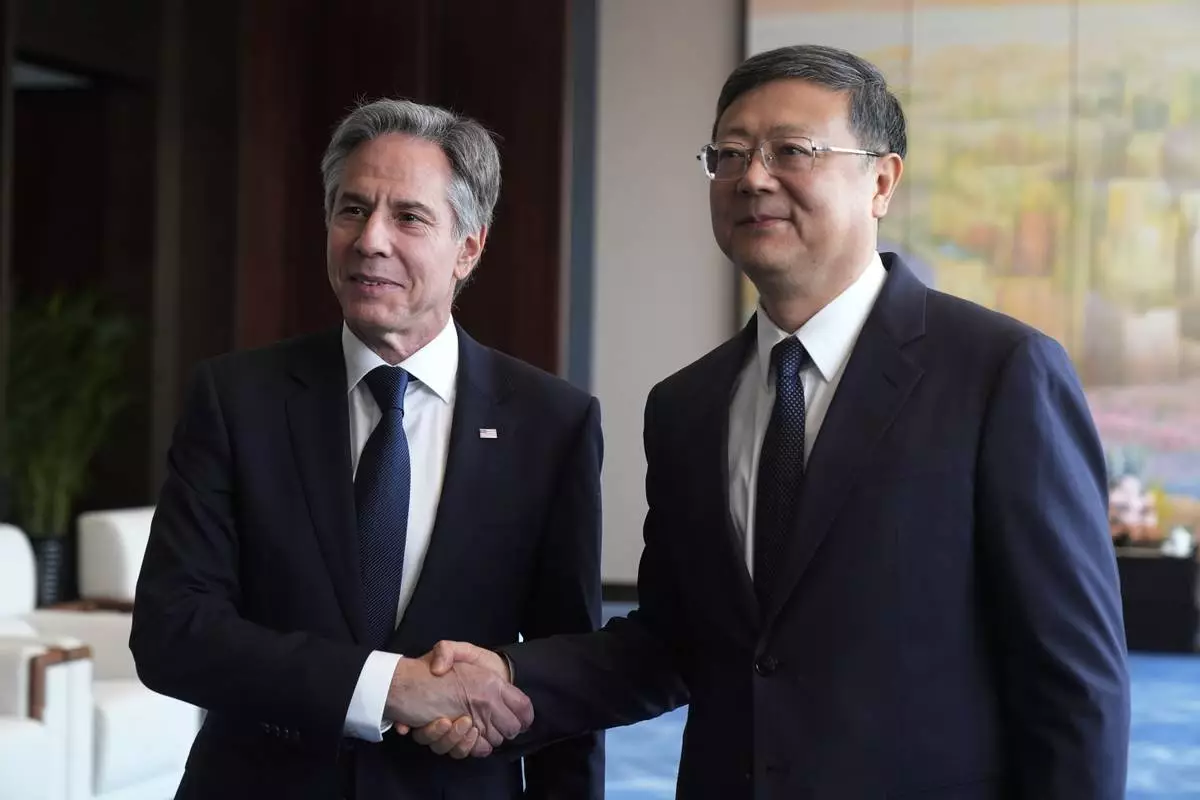
U.S. Secretary of State Antony Blinken, left, meets with Shanghai Party Secretary Chen Jining at the Grand Halls, Thursday, April 25, 2024, in Shanghai, China. (AP Photo/Mark Schiefelbein, Pool)
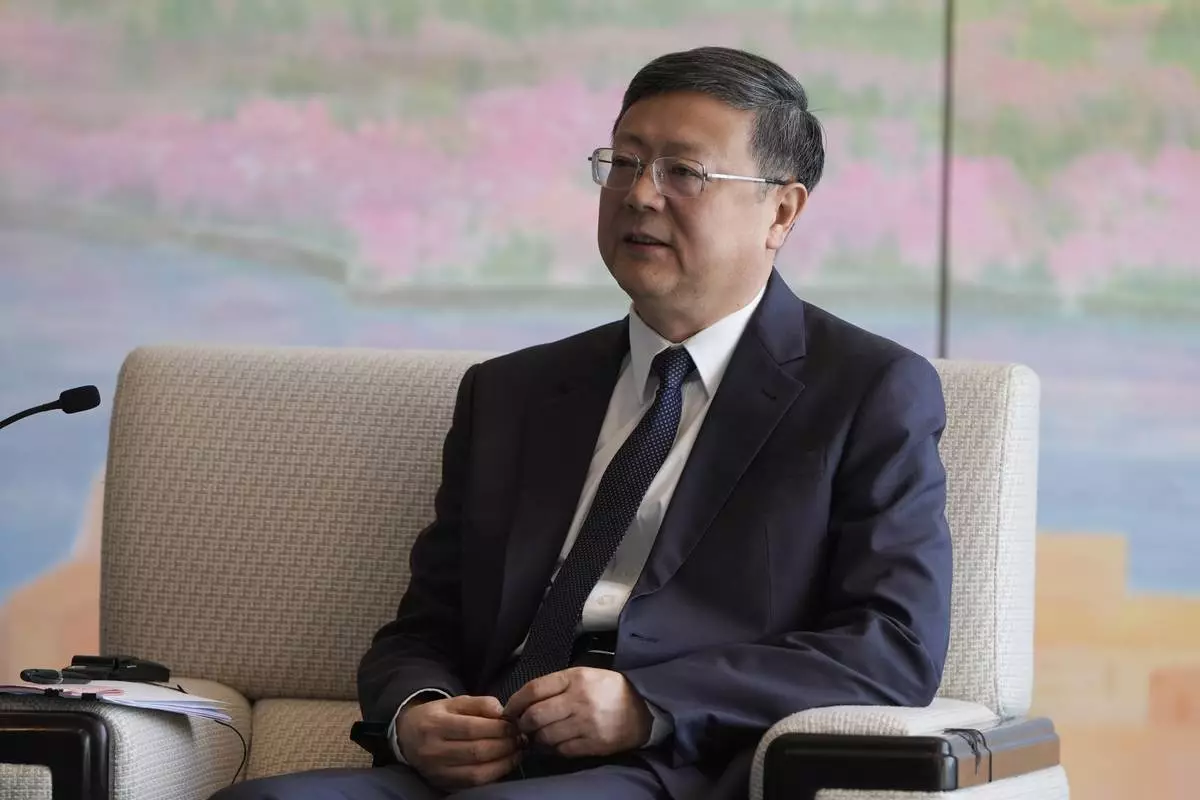
Shanghai Party Secretary Chen Jining talks with U.S. Secretary of State Antony Blinken at the Grand Halls, Thursday, April 25, 2024, in Shanghai, China. (AP Photo/Mark Schiefelbein, Pool)
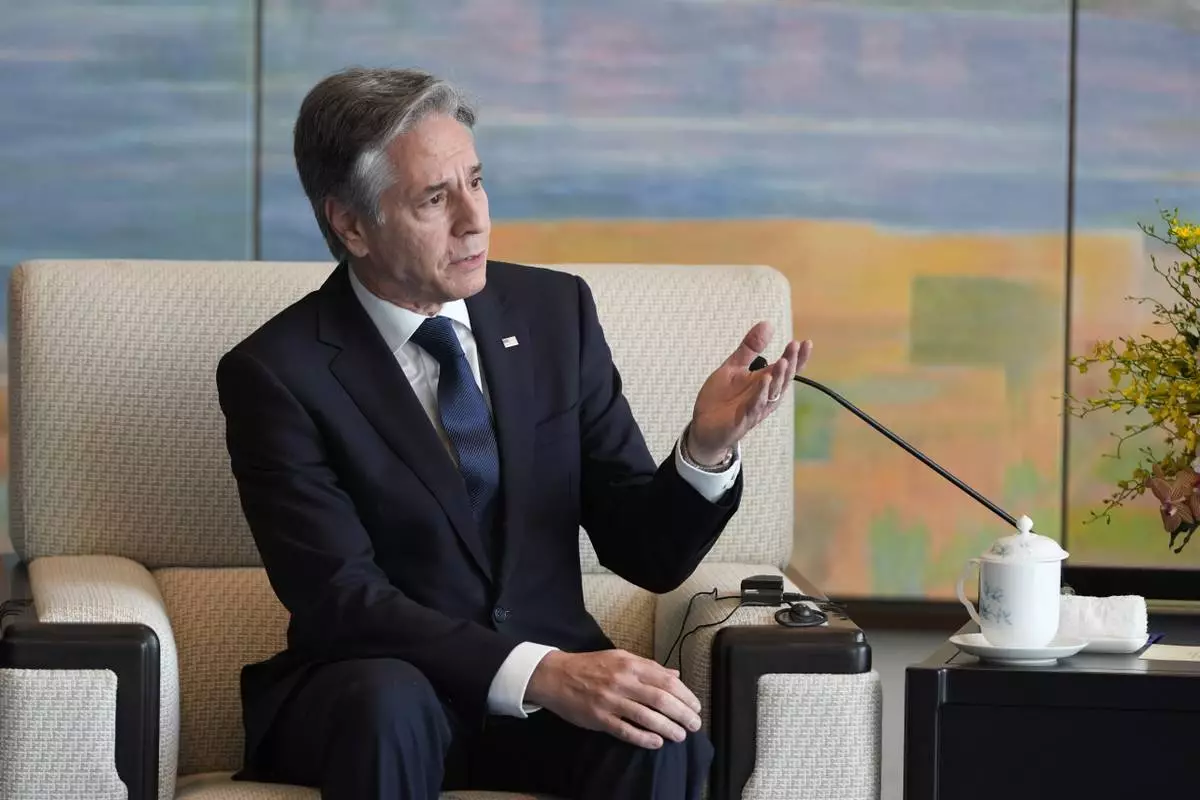
U.S. Secretary of State Antony Blinken talks with Shanghai Party Secretary Chen Jining at the Grand Halls, Thursday, April 25, 2024, in Shanghai, China. (AP Photo/Mark Schiefelbein, Pool)
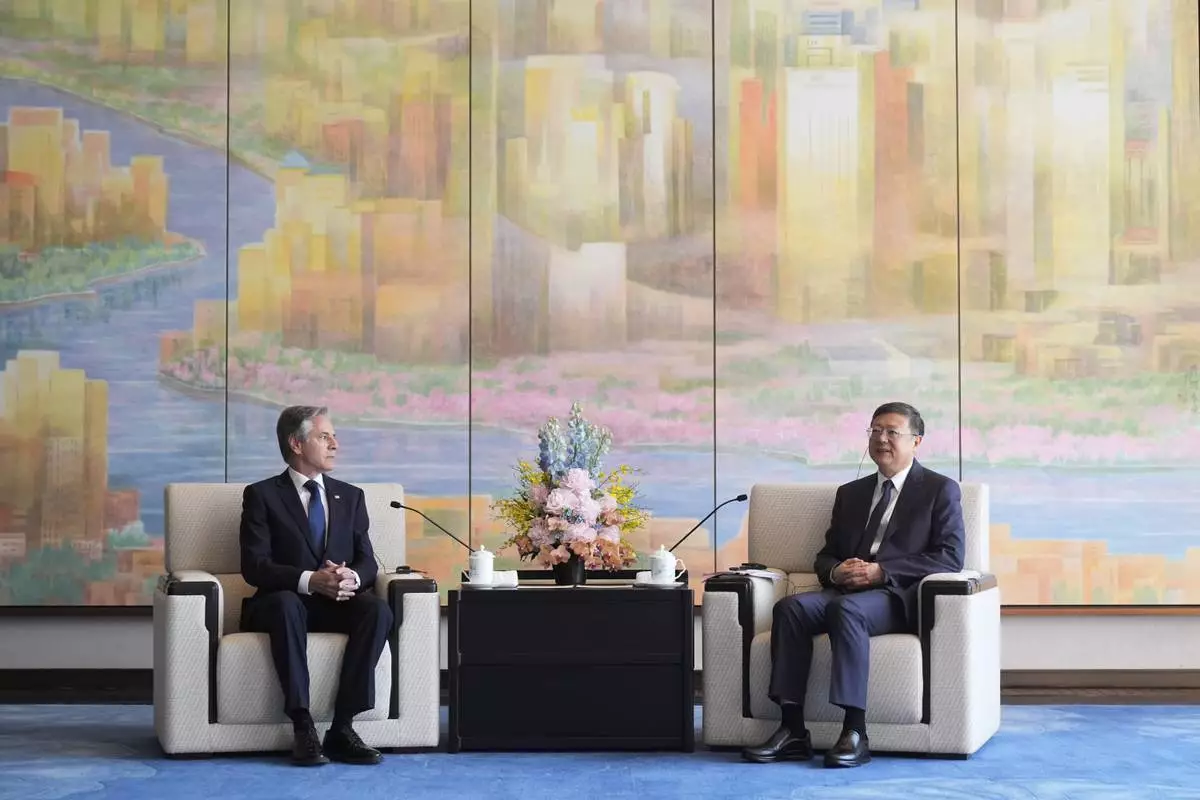
U.S. Secretary of State Antony Blinken, left, talks with Shanghai Party Secretary Chen Jining at the Grand Halls, Thursday, April 25, 2024, in Shanghai, China. (AP Photo/Mark Schiefelbein, Pool)
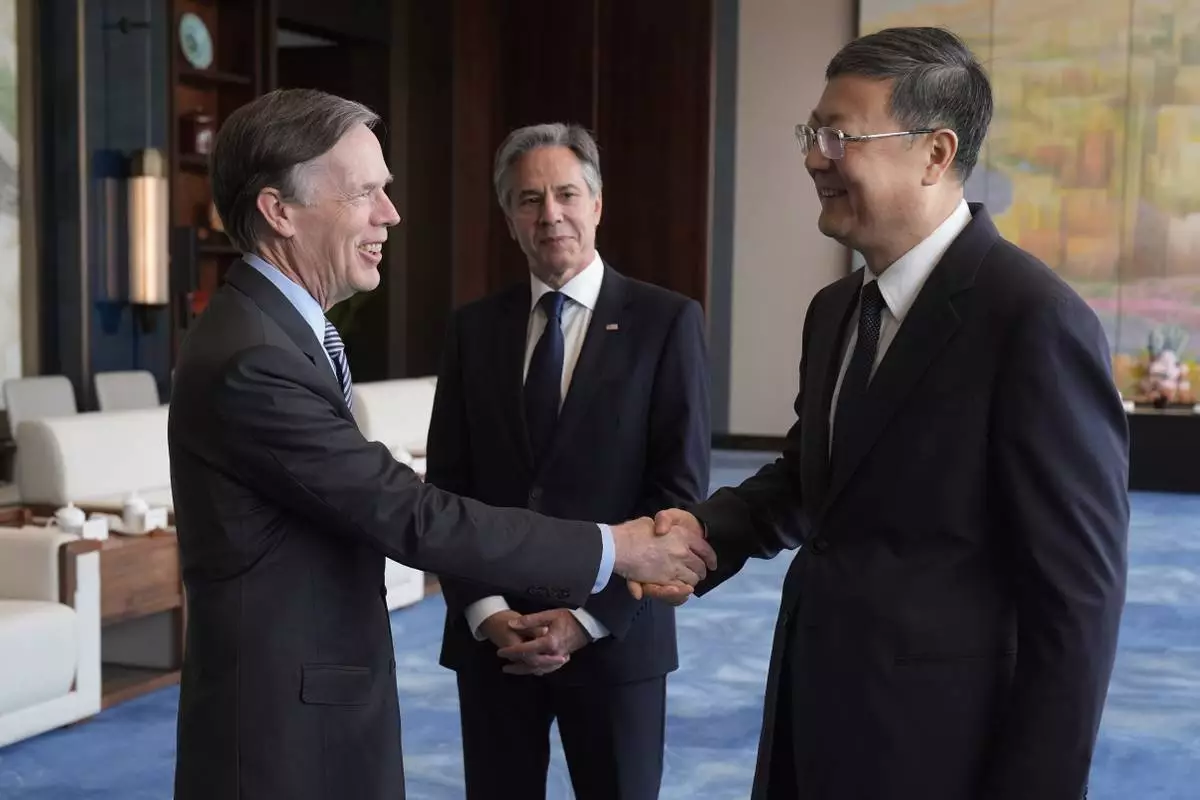
U.S. Secretary of State Antony Blinken, center, watches U.S. Ambassador to China Nicholas Burns, left, shake hands with Shanghai Party Secretary Chen Jining at the Grand Halls, Thursday, April 25, 2024, in Shanghai, China. (AP Photo/Mark Schiefelbein, Pool)
























